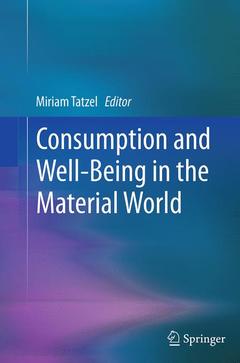Consumption and Well-Being in the Material World, Softcover reprint of the original 1st ed. 2014
Coordonnateur : Tatzel Miriam

This volume addresses how we can find happiness and well-being in the material world. It builds on previous works that find that materialism is associated with lowered well-being (materialists are less happy) and that consumerism, in all its profusion, is harmful to environmental well-being. How can we use the money and possessions in our lives in the service of well-being? Apparently not by being materialistic. Can we benefit from the many wonders of the marketplace -- in technology, convenience and aesthetics -- without falling prey to the lures and dangers of excessive material preoccupation? Can we meet our material needs in ways that nourish growth and well-being? The authors of the chapters in this volume are on-going researchers into such questions. Herein you can learn about the hedonic benefits of thrift and of spending on experiences; how possessions can be beneficial; how different types of consumers spend money; cultural variations in conceptions of the "good life;" how we might reconcile environmental and consumer well-being; and how to measure the whole of human, economic, and environmental well-being. Taken all together, this collection finds grounds for compatibility between what's good for the consumer and what's good for the environment.
This volume appeals to academics, professionals, students and others interested in materialism and consumer well-being.
Introduction.- Chapter 1: Consumption and Well-Being, An Introduction; Miriam Tatzel.- PART I: Money and Consumption for Well-Being.- Chapter 2: Money for Happiness: The Hedonic Benefits of Thrift; Joseph Chancellor and Sonja Lyubomirsky.- Chapter 3: Getting the Most for the Money: The Hedonic Return on Experiential and Material Purchases; Travis J. Carter and Thomas Gilovich.- Chapter 4: Loneliness, Material Possession Love and Consumers' Physical Well-Being; John L. Lastovicka and Laurel Anderson.- PART II: Individual and Cultural Variations.- Chapter 5: Value Seekers, Big Spenders, Non-Spenders and Experiencers: Consumption, Personality and Well-Being; Miriam Tatzel.- Chapter 6: Money, Materialism and the Good Life: Cultural Perspectives; Christie Napa Scollon and Derrick Wirtz.- PART III: Consumption and Sustainable Well-Being.- Chapter 7: Happy Planet, Happy Economy, Happy Consumers? Charles Seaford.- Chapter 8: Measuring What Matters; Eric Zencey.- Conclusion.- Chapter 9: Confessions of a Closet Materialist: Lessons Learned about Money, Possessions and Happiness; Miriam Tatzel.
Addresses materialism and well-being from individual to global levels
Applies positive psychology to the consumer domain
Shows how money can be spent in support of well-being
Strikes a middle ground between anti-consumerism and the promotions of the marketplace
Grounded in findings by leading researchers
Includes supplementary material: sn.pub/extras
Date de parution : 08-2016
Ouvrage de 198 p.
15.5x23.5 cm
Disponible chez l'éditeur (délai d'approvisionnement : 15 jours).
Prix indicatif 105,49 €
Ajouter au panierDate de parution : 10-2013
Ouvrage de 198 p.
15.5x23.5 cm
Disponible chez l'éditeur (délai d'approvisionnement : 15 jours).
Prix indicatif 105,49 €
Ajouter au panierThèmes de Consumption and Well-Being in the Material World :
Mots-clés :
Consumer Behavior; Consumer Types; Consumer and Environmental Well-Being; Consumption and Well-Being; Culture and the Good Life; Ecological Economics; Experiential Purchases; Frugality and Materialism; Hedonic Adaptation; Hedonic Benefits of Thrift; Loneliness and Possession Love; Materialism and Well-Being; Money for Happiness; Positive Psychology; Sustainable Well-Being



